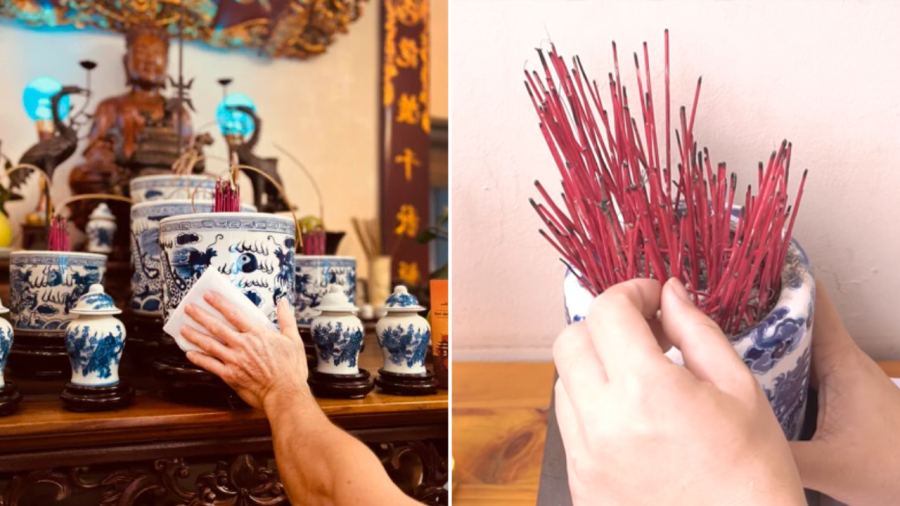In feng shui, the altar is considered the focal point of a family’s spiritual energy. Therefore, cleaning the altar, or “bao sai,” is an important ritual for Vietnamese families, especially during the Lunar New Year. This practice involves tidying up the altar, rearranging the offerings, and trimming the incense sticks to invite the ancestors’ spirits for the New Year celebration.
A full incense burner is believed to hinder the flow of energy and bring bad luck to the family. Thus, in addition to cleaning the altar, the homeowner will also remove some of the incense sticks before the New Year.
Performing bao sai carefully during the Lunar New Year not only ensures a clean and solemn worship space but also symbolizes the purification of negative energies and the welcoming of new fortunes in the coming year.
Auspicious Days for Cleaning the Altar and Trimming Incense Sticks for the 2024 Lunar New Year
According to feng shui experts, there are two particularly auspicious days left in the Year of the Rabbit to perform these rituals: cleaning the altar and trimming the incense sticks. Doing so on these days is believed to bring good luck and blessings to the homeowner.
– December 26 of the lunar calendar (February 5, 2024): This is a Huang Dao day, considered favorable for rituals such as bao sai and incense trimming, to seek protection and blessings from the deities. Auspicious time frames on this day include: 7:00-9:00 AM, 11:00 AM-1:00 PM, and 1:00-3:00 PM.
– December 28 of the lunar calendar (February 7, 2024): An ideal day for purification and altar cleaning. Any endeavors on this day are believed to bring joy, good luck, and financial prosperity. Auspicious time frames include: 5:00-7:00 AM, 9:00-11:00 AM, and 3:00-5:00 PM.

If neither of these days works for you, consider one of the following three days, which are also suitable for bao sai:
– December 24 of the lunar calendar (February 3, 2024). Auspicious time frames: 5:00-7:00 AM, 11:00 AM-1:00 PM, 1:00-3:00 PM, and 3:00-5:00 PM.
– December 29 of the lunar calendar (February 8, 2024). Auspicious time frames: 7:00-9:00 AM, 9:00-11:00 AM, and 1:00-3:00 PM.
– December 30 of the lunar calendar (February 9, 2024). Auspicious time frames: 5:00-7:00 AM, 11:00 AM-1:00 PM, 1:00-3:00 PM, and 5:00-6:00 PM.
If none of these auspicious days work for you, you can also perform bao sai on the 15th day of the lunar month or on the day of Ong Cong Ong Tao (Kitchen Gods). These days are also considered appropriate for altar cleaning.
– The 15th day of the lunar month (January 25, 2024): The 15th day of the lunar month and the 1st day of the lunar month are considered sacred. Performing bao sai on this day is perfectly acceptable.
– December 23 of the lunar calendar (February 2, 2024): This is the day when the Kitchen Gods return to heaven to report on the family’s activities over the past year. As it is a Tu Menh Huang Dao day, performing bao sai on this day is considered both auspicious and a sign of reverence, bringing peace and good fortune in the new year.
Notes on Performing Bao Sai
– Prepare clean and separate tools
When performing bao sai during the Lunar New Year, it is recommended to use new and clean tools. Use a new cloth to wipe the altar. Instead of plain water, use fragrant water or five-spice water for cleaning, as they are believed to have a purifying effect and bring cleanliness and serenity to the worship space.
– Offer incense and ask for permission before starting
Before beginning bao sai, the homeowner may offer a small ritual and burn incense while reciting a prayer to seek permission from the deities and ancestors to proceed with the cleaning.
Additionally, the person performing the cleaning should be clean and dressed appropriately. They should also maintain a calm and respectful mindset throughout the process.
– Do not move the incense burner, spirit tablet, or deity statue
During bao sai, be careful not to move the incense burner, spirit tablet, or deity statue. The incense burner is believed to be the focal point of spiritual energy, connecting the physical world with the spiritual realm. Moving it could disrupt this connection.
When trimming the incense sticks, leave a few sticks, preferably an odd number (3, 5, 7, or 9). Wrap the removed incense sticks in clean newspaper, burn them, and bury the ashes under a large tree.





































